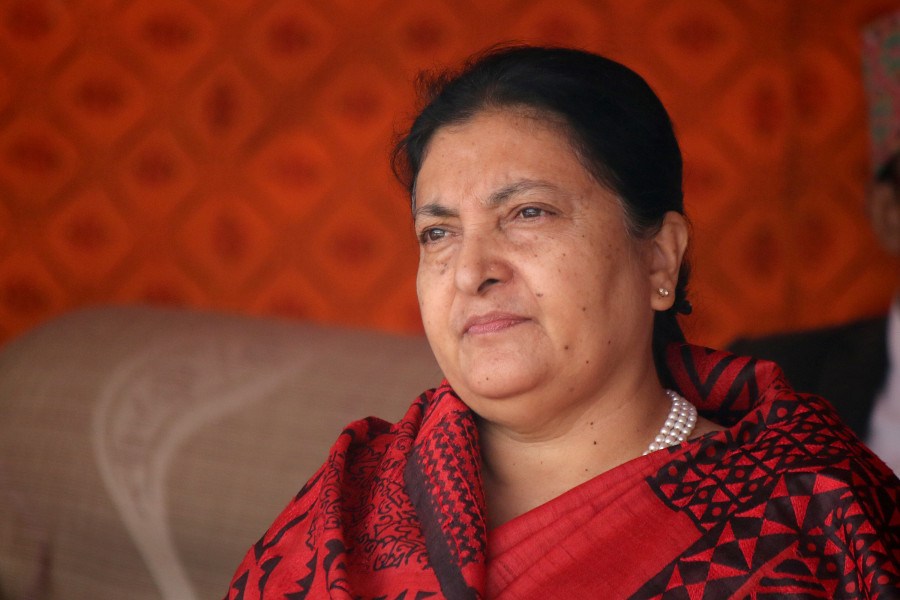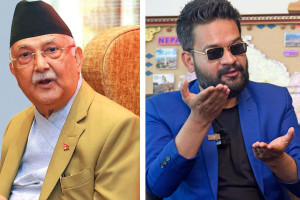Columns
Upending politics and geopolitics
Bidhya Devi Bhandari’s re-entry into party politics is likely to disrupt both politics and geopolitics.
Ajaya Bhadra Khanal
Top leaders of the Nepali Congress and the Communist Party of Nepal (UML) sat down last Tuesday to assess the country’s situation. Among others, they discussed the repercussions of former President Bidhya Devi Bhandari’s return to party politics.
According to a newspaper report, NC leader Sher Bahadur Deuba told Prime Minister KP Oli that her return would harm democracy, federalism and the current political system. PM Oli, meanwhile, is reported to have said that the party is yet to take a decision on what has so far been a personal decision of a former President.
What was clear from the meeting was that both PM Oli, and NC leader Deuba see Bhandari’s return as a threat, not just to democracy, but also to their personal political ambitions.
The return of Bhandari to active politics appears to have shaken the current political dispensation.
Her re-entry is significant from at least two perspectives. First, it completely disrupts the geopolitical game in Nepal, and second, it interferes with the political settlement designed by the stalwarts of the two largest parties in Parliament, in collusion with each other.
The potential disruption in such political settlements, which have been working so well for their two leaders, poses the possibility of fundamental shifts in Nepal’s political trajectory. Unfortunately, these shifts may have an equal measure of positives as well as negatives.
First, let’s focus on the geopolitical game.
Nepali society appears to be polarised when it comes to Nepal’s relations with China, India and the West. Particularly, after 2015, anti-Indian nationalism has grown in Nepal encouraging the leftist political parties to edge closer to China. Although Nepal’s economic growth requires closer economic cooperation with India and the West, the political psychology of leftist and extreme rightist forces has made it difficult for Nepal to pursue that path.
Geopolitically, Bhandari’s re-entry could further polarise our society.
Bhandari’s preparations to re-enter politics have been going on for a long time now, and even when she was President, she took several controversial decisions to support the UML. However, the timing of her announcement, which took place immediately after her China visit, has raised questions about her relationship with China.
According to party insiders, China played a significant role in merging the UML and the CPN Maoist Centre in October 2017. While the rest of the country had quieted down for the Dashain holidays in October of that year, the two major leftist forces had made a surprise announcement—they were going to merge after the series of local and parliamentary elections in 2017.
The two parties formally merged in May 2018 as the Nepal Communist Party and became the largest party in the 275-member House of Representatives with 174 seats. The merger, however, could not last long. They formally reverted to their pre-merger state in March 2021, when the Supreme Court ruled that the Nepal Communist Party (NCP) registered with the Election Commission was illegitimate.
Nepal, once again, went back to its old ways of frequently changing governments.
During this period, China has intensified its political party diplomacy, and Bhandari’s group has been trying to spread the message that China endorses her as an eminent political leader of the UML.
China had formally invited Bhandari to take part in the fourth dialogue of its Global Civilisation Initiative in May. Interestingly, the GCI has close connections to China’s political party diplomacy. If we look at Xi Jinping’s statement in March 2023, where he announced the GCI, or his statement in July 2021, we see political diplomacy as an important tool of exporting China’s views about development and governance models. GCI is the central vehicle to conduct such political diplomacy.
Politicians with direct knowledge say that China still wants to see a united left force with the Nepali Congress offering a counterbalance on the other side. This initial two-party system, for the Chinese, could offer more political stability and predictability in Nepal’s policy-making.
In this sense, China’s courting of Bhandari as the flagship figure in its GCI-related activities in Nepal has significant implications.
Another arena where Bhandari’s politics could have an impact, if she is successful, is political settlement within and outside the UML.
In the UML, top political leaders are gradually moving away from the grassroots people who supported them in the old days. Differences of opinion are punished, to the extent that dissenting voices are censored.
Party leaders in UML point out at least three disturbing tendencies inside the party. The first is Oli’s increasingly autocratic behaviour, the second is his alienation of grassroots party workers who have historically contributed to the party, and the third is his alliance with a new group of people completely isolated from the party base.
Bhandari’s reentry is likely to rearrange power distribution within the party as many leaders and party workers disaffected by Oli are turning to her. Her swift rise as an alternative can, thus, be attributed to existing discontent in the party as well as her flaunting of close and intimate relations with China.
Nevertheless, even Bhandari does not appear to be able to address the deep-rooted problem in the party regarding the alienation of the party base, disruption of conventional democratic practices within the party, and alliance with individuals disconnected from the party base. This has led to low morale among the party workers who don’t see any prospect of the party’s democratic rejuvenation.
Bhandari’s return to politics, however, has shaken not only the UML but also the NC and the political arrangement that Deuba has orchestrated.
At present, political settlement among the top leaders, as well as a broader range of parties, is orchestrated by the partnership of Deuba and Oli. This collusive relation, among the two largest parties in the Parliament, is undermining democratic and constitutional processes even as the two share in the spoils of power and wealth extracted through the political arrangement.
At one point, this arrangement was threatened by the CPN (Maoist Centre) and the Rastriya Swatantra Party, who had been sidelined. But now, Bhandari’s party politics poses a threat to the arrangements the two leaders have worked out, including Deuba’s future premiership.




 10.12°C Kathmandu
10.12°C Kathmandu.jpg)















